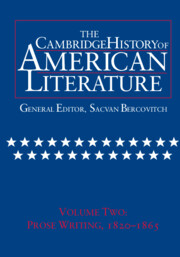Book contents
- Frontmatter
- Introduction
- CONDITIONS OF LITERARY VOCATION
- THE LITERATURE OF EXPANSION AND RACE
- THE TRANSCENDENTALISTS
- NARRATIVE FORMS
- 1 Establishing National Narrative
- 2 Local Narratives
- 3 Personal Narratives
- 4 Literary Narrative
- 5 Crisis of Literary Narrative and Consolidation of National Narrative
- Chronology
- Bibliography
- Index
5 - Crisis of Literary Narrative and Consolidation of National Narrative
from NARRATIVE FORMS
Published online by Cambridge University Press: 28 March 2008
- Frontmatter
- Introduction
- CONDITIONS OF LITERARY VOCATION
- THE LITERATURE OF EXPANSION AND RACE
- THE TRANSCENDENTALISTS
- NARRATIVE FORMS
- 1 Establishing National Narrative
- 2 Local Narratives
- 3 Personal Narratives
- 4 Literary Narrative
- 5 Crisis of Literary Narrative and Consolidation of National Narrative
- Chronology
- Bibliography
- Index
Summary
NATIONAL NARRATIVE IN 1851
The Compromise of 1850 had displaced politics and opened a possibility for the literary narratives of Hawthorne and Melville, but in the years before the Civil War, American national narrative still flourished. Volumes 4 through 7 of Bancroft's History of the United States appeared from 1852 through 1860, and in 1851 Moby-Dick made far less of an impact than did two works that had adapted national narrative to establish careers for their authors which would outshine Melville's through the rest of the century: Harriet Beecher Stowe began serial publication of Uncle Tom's Cabin in the Washington abolitionist journal the National Era, and Francis Parkman published The History of the Conspiracy of Pontiac. Like Moby-Dick, both these works are on a large scale. They range broadly over the geography of North America, and they encompass a wide range of human experience, including shocking extremities of horror. Like Moby-Dick, too, they present problems that arise from the multiracial character of the United States, from its colonial past into the present. Their commitment to national narrative, as opposed to the subordination of national to literary narrative in Moby-Dick, may be gauged most readily through their narrative technique. They establish no fictional intermediary like Ishmael; rather, they encourage readers to identify the narrating presence with the author, who in each case holds a clear ideological position on issues of major national consequence.
- Type
- Chapter
- Information
- The Cambridge History of American Literature , pp. 735 - 778Publisher: Cambridge University PressPrint publication year: 1995

